What Is Carbohydrate Food: The Function|Good Carbs|Bad Carbs -Details-2020
John asked me -What Is Carbohydrate Food?
Carbohydrates are one of the main energy sources for the human body.
The primary function of carbohydrates is to supply energy for the body, especially for the brain and the nervous system.
In Healthy-myself I will share with you about-What is Carbohydrate Food, Rich In Carbohydrates, & Carbohydrate Classification and a lot…
So, stick here and take a glass of water and grab this opportunity to know about-Carbohydrate in detail.
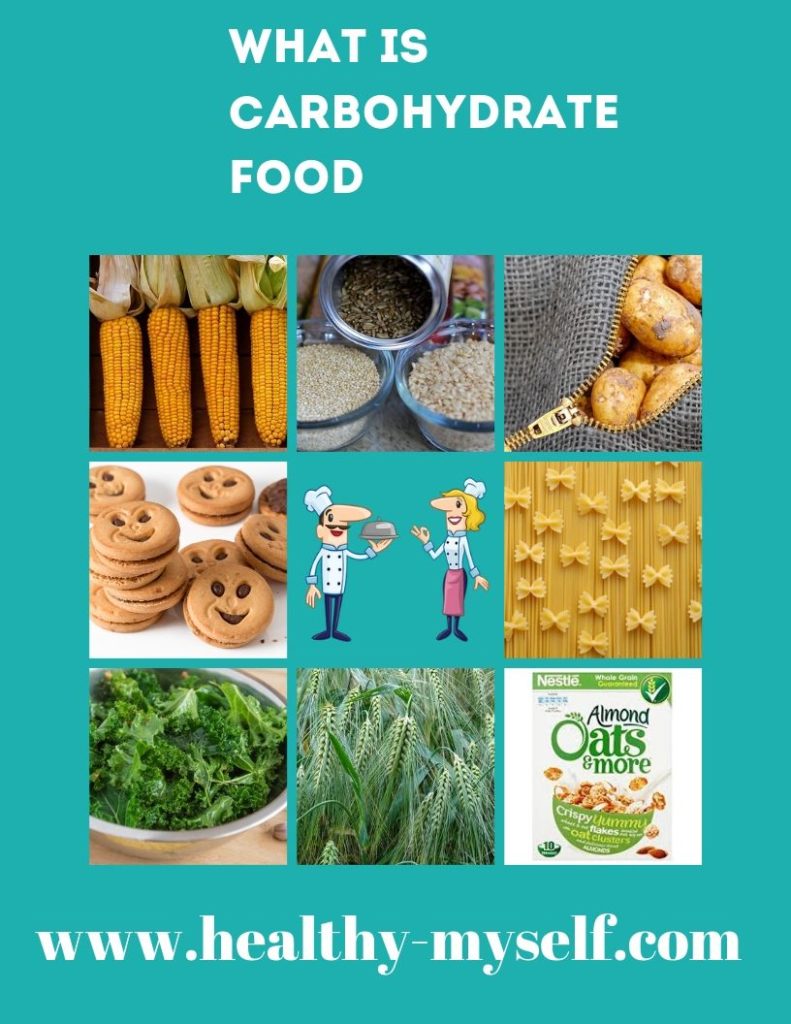
Contents
1. What is Carbohydrate Food :
When you think of the word “What is Carbohydrate food”, the first image that might pop into your head maybe a bowl of pasta, a baked potato or a plate of rice. And you’re right!
Whole foods are high in carbs and generally offer lots of essential nutrients and health benefits for our bodies.
People with a specific health issue or concern should talk to their doctor.
Or a registered dietitian to determine which high-carb foods are right for them.
Carbohydrates are found in the sugars, starches, and fibers.
And found in fruits, grains, vegetables, and milk products.
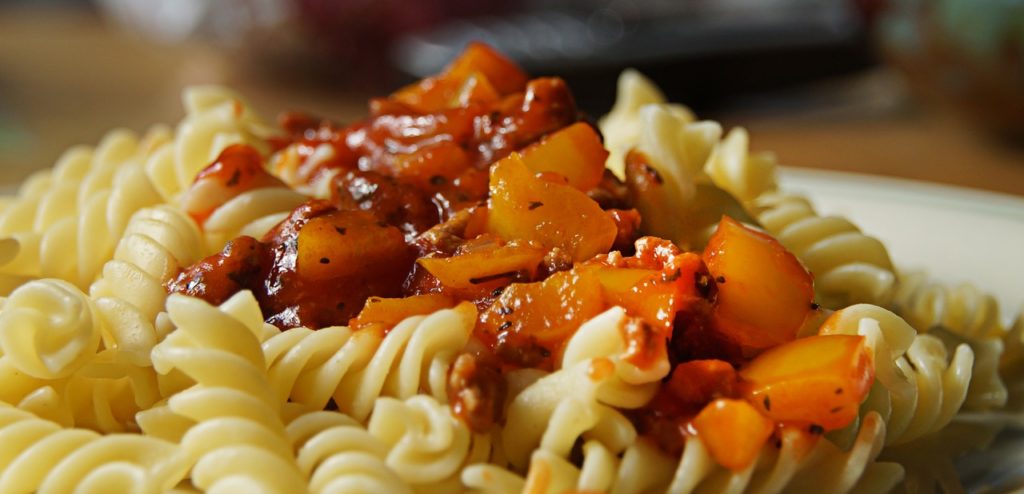
Though often maligned in trendy diets, carbohydrates -are one of the basic food groups — and are important to a healthy diet.
“Carbohydrates are macronutrients.
It means they are one of the 3 main ways the body obtains energy or calories.
They are called carbohydrates.
At the chemical level and, they contain carbon, hydrogen, and oxygen.
There are 3 macronutrients: carbohydrates, protein, and fats.
Hence, Macronutrients are very essential for proper body functioning.
And the body requires large amounts of them.
All macronutrients must be obtained through diet.
The body cannot produce macronutrients on its own.
The recommended daily amount (RDA) of carbs for adults: 135 gms/day.
Carb intake for most people should be: between 45% to 65% of total calories.
One gram of carbohydrates equals about 4 calories.
So a diet of 1,800 calories /day would equal about 202 gms on the low end and 292 gms of carbs on the high end.
However, people with diabetes should not intake more than 200 gms of carbs per day.
In the case of pregnant women- need at least 175 gms/day.
Here are food groups and a few examples:
Dairy –
Milk, yogurt, and ice cream
Fruit–
Whole fruit and fruit juice
Grains–
Bread, rice, crackers, and cereal
Legumes –
Beans and other plant-based proteins
Starchy Vegetables –
Potatoes and corn
Sugary Sweets –
Soda, candy, cookies, and other desserts
Bread and grains-
It comes in various forms, including loaves, rolls, bagels, and flatbreads, such as tortillas.
However, all of these are high in carbs.
This is true for whole-grain varieties as well as those foods made from refined flour.
White bread (1 slice): 14 grams of carbs, 1 of which is fiber
Whole-wheat bread (1 slice): 16 grams of carbs, 2 of which are fiber
Flour tortilla (10-inch): 35 grams of carbs, 2 of which are fiber
Bagel (3-inch): 28 grams of carbs, 1 of which is fiber
N.B: Most bread & grains, including whole grains and whole-grain bread, are too high in carbs to include on a low-carb diet.
Fruits:
Banana (1 medium): 27 grams of carbs, 3 of which are fiber
Raisins (1 ounce / 28 grams): 22 grams of carbs, 1 of which is fiber
Dates (2 large): 36 grams of carbs, 4 of which are fiber
Mango, sliced (1 cup / 165 grams): 28 grams of carbs, 3 of which are fiber
Pear (1 medium): 28 gms of carbs, 6 of which are fiber.
Starchy vegetables-
Most diets allow us to intake of low-starch vegetables.
What’s more?
If you’re following a very low-carb diet, then your best choice is to avoid these starchy vegetables altogether.
Corn (1 cup / 175 grams): 41 grams of carbs, 5 of which are fiber
Potato (1 medium): 37 grams of carbs, 4 of which are fiber
Sweet potato/yam (1 medium): 24 grams of carbs, 4 of which are fiber
Beets, cooked (1 cup / 150 grams): 16 grams of carbs, 4 of which are fiber.
N.B: It’s best to choose that most non-starchy, high-fiber vegetables when limiting your carb intake.
2.The function of carbohydrates:
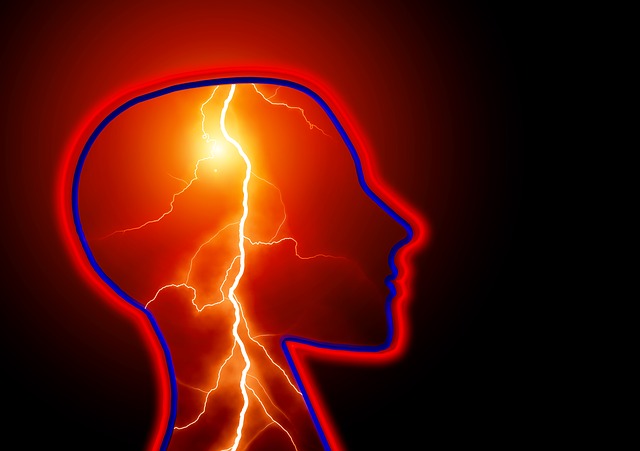
Carbohydrates provide fuel for your central nervous system and provide energy for the working muscles.
You can use Muscle Gainer also-

Also, carbohydrates are important for brain function.
They are an influence on -mood, memory, etc.
As well as a quick energy source.
In fact, the RDA of carbohydrates is based on the number of carbs the brain needs to function.
3.Food Rich In Carbohydrate:
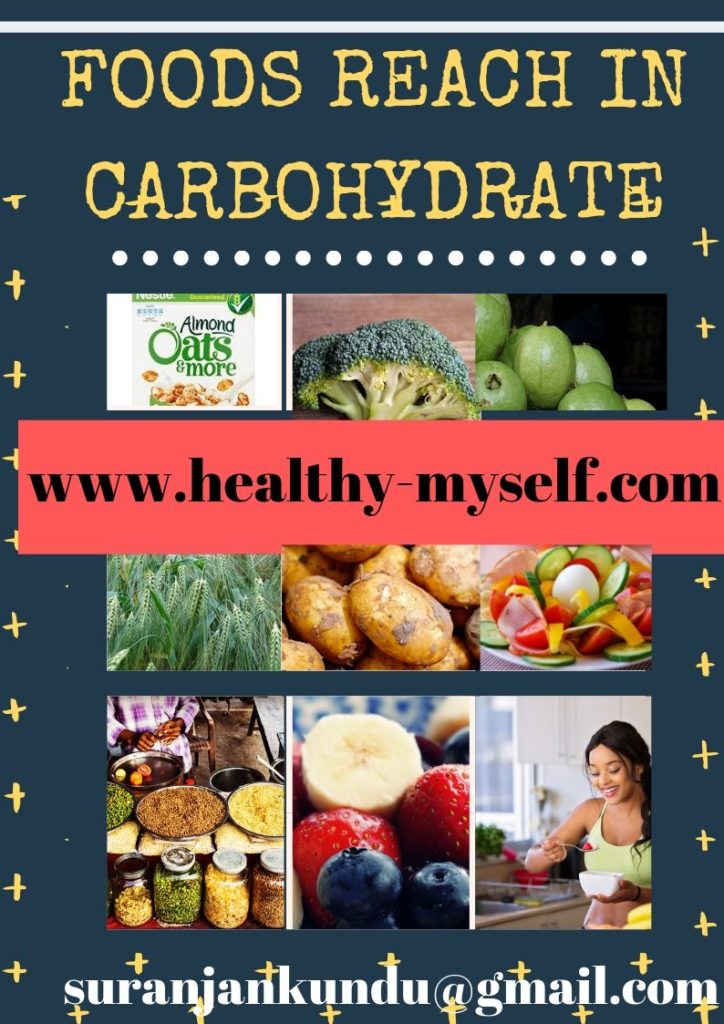
Carbohydrates are organic compounds that contain only carbon (C)(C), hydrogen (H)(H), and oxygen (O)(O).
It contains a chain of carbons, an aldehyde or a ketone, and hydroxyl groups.
3.1.High-carb vegetables-
Adding these healthful and high-carb vegetables to a meal will boost its carbohydrate content:
1. Sweet potatoes-
Sweet potatoes are delicious foods to include in a range of meals.
2. Beets-
Beetroots, or beets, are such a sweet, purple root vegetable which people can eat either raw or cooked condition.
3. Corn-
Corn is a very popular vegetable that people can enjoy year-round as a side dish, on the cob, or with the salad.
3.2.High-carb grains-
However, Grains which are the seeds of broadleaf plants are great sources of carbohydrates.
Whole-grain varieties provide you protein & fiber.
And offer plenty of additional healthful benefits.
Grains are versatile and can form the main part of many meals.
Rather than eating white rice and white bread.
People can include the following healthy high-carb grains into their diet:
1. Quinoa-
It is a nutritious pseudo-grain.
It tastes is similar to other types of grain but people can prepare and eat it in the same way.
One Cup of quinoa contains-
- 39.40 gm of carbs
- 8.15 gm of protein
- 1.60 gm of sugar.
2. Brown rice-
Brown rice is a common side dish.
And it is a healthful alternative to white rice.
One cup of cooked brown rice has 36 gm of carbohydrates.
This grain is also rich in Antioxidants.
3. Oats-
Oats are one of the most healthful.
And versatile whole grains.
Different varieties are available, including rolled, steel-cut, and quick oats.
A cup of old-fashioned rolled oats will provide 27gm of carbohydrates.
In addition to 5 g of protein and 4 g of fiber.
3.3.High-carb fruits-
Fruits are an excellent source of carbohydrates, particularly these are as below:
1. Bananas-
They are widely available and make for a convenient snack.
One medium banana contains 27 gm of carbs.
Like sweet potatoes, they are also rich in potassium and vitamins A and vitamin C.
2. Apples-
Apples are crunchy fruits that it is possible to buy year-round in grocery stores.
They come in many varieties.
One medium size of an apple contains 25 gm of carbohydrates.
It also provides vitamins A and C, potassium, and fiber.
3. Mangos-
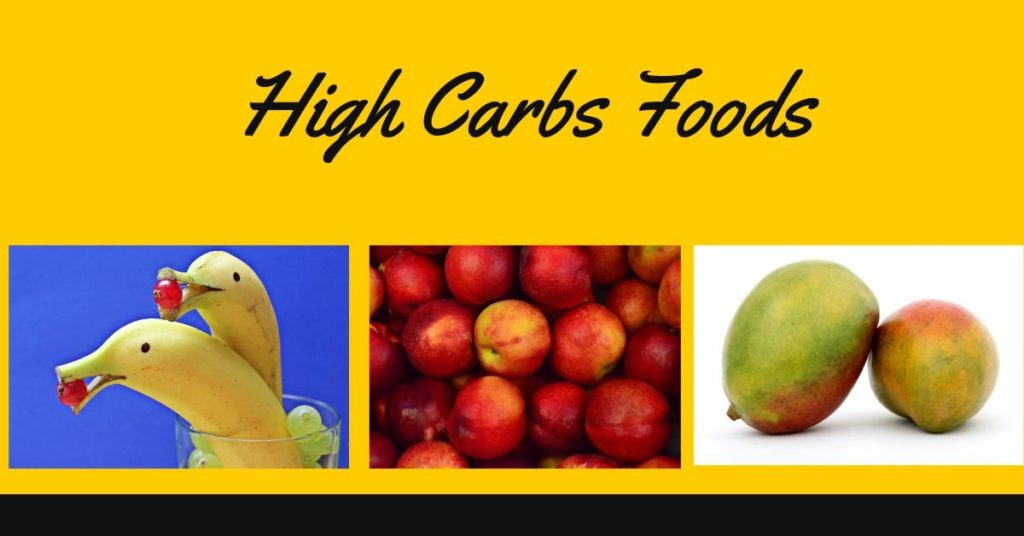
They are a sweet tropical fruit.
One cup of chopped mangos has 24 gm of carbohydrates.
Mangos are also high in vitamins A and vitamins C, potassium, and fiber.
Try adding mango chunks to breakfast cereals or smoothies.
Mango is also great eaten alone as a snack.
3.4.High-carb dried fruits-
A range of healthful dried fruits can help people achieve their daily carbohydrate needs.
People can try intake the following dried fruits alone as a snack or adding them to a trail mix or meal:
1. Dates-
There are many varieties of dates, and they are naturally sweet enough to be used as a sweet snack or dessert.
2. Raisins-
Raisins are dried grapes and that work as a standalone snack or can add flavor and texture to cereal bars, salads, yogurts, or granola.
Raisins are a good source of antioxidants also.
4.Good carbs vs. bad carbs-
Carbohydrates are found in foods you know are good for you i.e vegetables.
And ones you know very well are not doughnuts.
This has led to the idea that some carbs are found to be good and some carbs are to be bad.
Carbs which considered bad that- include pastries, sodas, highly processed foods, white rice, white bread, and other white-flour foods.
These are foods with simple carbs and not good for health.
Bad carbs rarely have any nutritional value, only for taste.
Carbs usually considered very good are complex carbs, such as whole grains, fruits, vegetables, beans, and legumes.
These are not only processed but also contain a bounty of other nutrients.
4.1.Good carbs :
- They are low or moderate in calories in terms of energy
- High in nutrients
- They devoid of refined sugars and refined grains
- High in natural fiber
- Low in sodium
- Low in saturated fat
- They are very low in, or devoid of, cholesterol and trans fats
4.2.Bad carbs :
- They are high in calories
- Full of refined sugars, just like corn syrup, white sugar, honey, and fruit juices
- High in refined grains -like white flour
- They are low in so many nutrients
- Low in fiber food
- High in sodium
- Sometimes high in saturated fat
- They are sometimes high in cholesterol and trans fats.
5.Some Special Carbohydrates for Healthy Body which is rich in Carbohydrate:
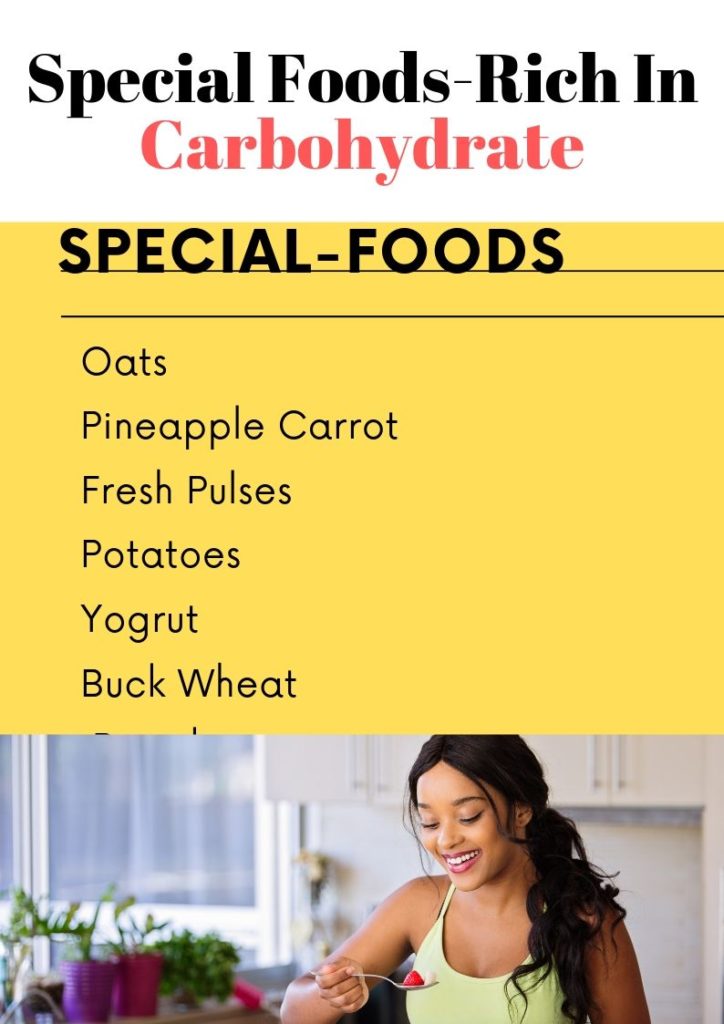
Some Special Foods-
1.Oats
2.Potatoes
3.Quinoa
4.Prunes
5.Pulses
6.Pumpkin
7.Buckwheat
8.Tart Cherries
9.Taro
10.Beets
11.Yogurt
12.Carrots
6.Conclusion:

Carbohydrates are the main energy source for our human health.
The primary function of carbohydrates is to give energy to the body.
Especially the brain & the nervous system.
An enzyme called amylase helps break down carbohydrates into glucose or blood sugar for further use.
If the body does not need to use the carbohydrates for the energy.
It then stores them into the liver and muscles.
If you enjoyed this blog post, share it with family and friends!
Did you find this blog post helpful? If so, who could share it with?
What am I missing here? Let me know in the comments section and I’ll add it in next!


Hey, you make a great job with https://healthy-myself.com/. The article about
What is Carbohydrate food: Function helps me and my friend Justine a lot in our Weight
Loss.
Hey, you make a great job with https://healthy-myself.com/. The article
about What is Carbohydrate food: Function helps me and my
friend Odessa a lot in our Weight Loss.
Hi, the What is Carbohydrate food: Function article it is well written and has helped me a lot.